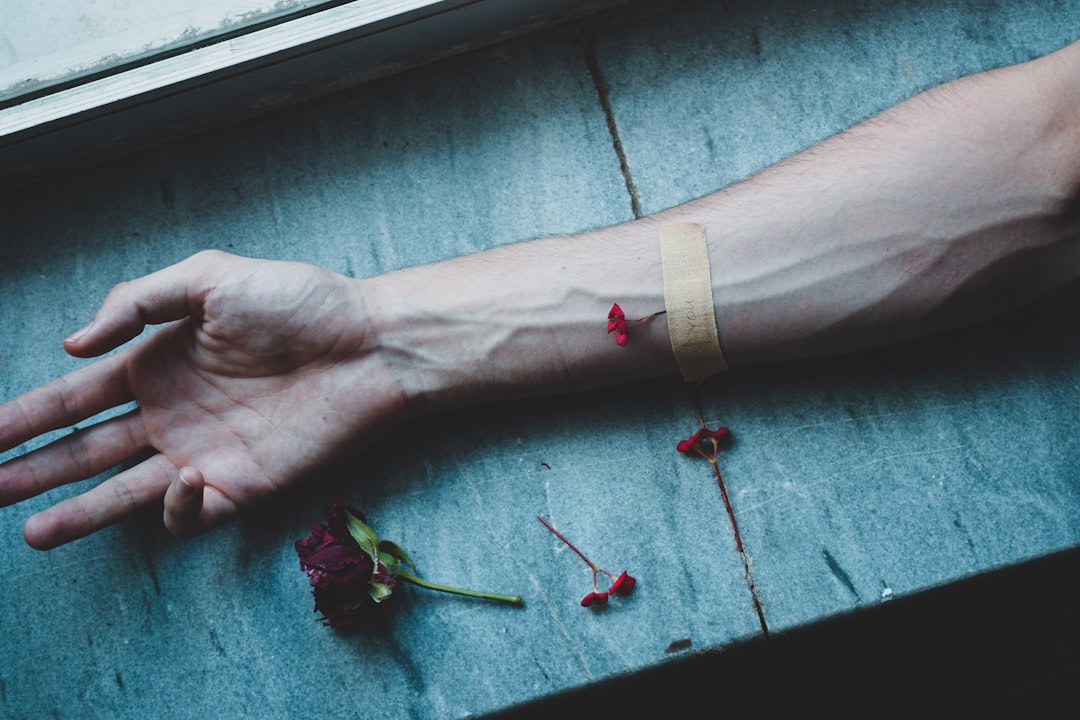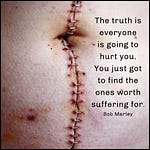
(Author’s Note: This is the second of two posts from 2015 when my Dad died.)
You know you're in denial when your adult children have to set you straight.
"Grandma can't take care of Grandpa anymore; the situation is out of control, and it won't get better."
They saw what my siblings and I didn't want to admit. As we struggled with what to do next, Dad fell again. My mom called me as I was getting ready for work and said she couldn't get him up alone. It took two people to get him back on his feet. She covered him with a blanket, put a pillow under his head, and he had to remain on the floor until I could get there.
I knew the time had come to move Dad into a nursing home. We all knew.
Later, I watched the EMT guys wheel him out of his front door for the last time. The realization that he was never coming back didn't hit me until weeks later.
He spent another few days in the hospital, and we went through the motions of "placing" him permanently in a local nursing home. What I remember most about this period was the surreal feeling it gave me. I had entered a new phase in my life; I switched places with my parents. They had always been my caretakers, and now they needed to be taken care of.
Knowing that something is the right thing to do doesn't mean it's easy.
I wanted my Dad to have in-home care, even though he didn't recognize it as home anymore. I wanted private duty nurses, but resources for that level of care weren't available. Dad required help to do everything: walk, bathe, eat, and use the bathroom. My mother had done her best, but she wasn’t in the greatest physical shape herself. Suffering from COPD for many years had restricted her mobility. My sister and I were single, working full-time. My brother lived out of town. There were no other alternatives.
Because of the cognitive impairment, Dad wouldn't use a walker or ask for help and fell every time he tried to walk. In addition, he was up multiple times during the night and tried to leave the house several times. It was evident that he needed constant monitoring.
We placed Dad in the nursing home just down the road from my apartment building. I drove by it on my short commute to work. In those first few months, I cried every time I passed by. He had been an active, social person his entire life, which I believe is why he always wanted to get up from his wheelchair. He felt the need to go somewhere or do something but couldn't remember what. We watched his world shrink, and our hearts grew heavier as it grew smaller.
We visited 3 to 4 times a week, which was always tricky. Some visits were better than others, depending on Dad's mood. For example, we learned about "sundown syndrome” and that he was more likely to be agitated in the early evenings. There were some pretty rough days where he demanded to leave and would swear and get mean. But other times, he was like his old self, rolling his eyes at the other residents and telling funny stories about them. During these fleeting moments, I had my Dad back, and they remain in my memory like momentary bursts of sunlight in those dark days.
He only lasted nine months. Despite being placed there for his own safety, he fell 66 times. Because the law won't allow restraints of any type, my father continued his quest to get up and get going. In addition, only three staff members were in charge of 15 patients in the Dementia Unit. As a result, he suffered more injuries in those last months than he had in his entire life. Yet, amazingly, he never broke a bone.
The guilt I felt for the pain that he suffered was unbearable. One evening, around 10:00 pm, I was trying to relax in a warm bath when the nursing home called. Dad had fallen and broken the skin on his arm. I was their contact person since Mom didn’t drive anymore. Despite being a minor injury, the nursing home must send them out to the hospital. I debated whether to hurry out of the tub and try to get there before my dad did. Then I realized it wouldn’t matter to him. He couldn’t remember who most of us were anymore, and I wept once again at this new reality. I never understood how sick the whole situation made me until he died.
The memory of my last communication with him was bittersweet and occurred five days before he passed. I took my mom's potato soup and a picture book I made. He ate the soup with difficulty, lifting the spoon shakily from bowl to mouth. They advised us to let the patient do as much for themselves as possible, for as long as possible. I didn't know it then, but it was his last meal. I’ll always regret not spoon-feeding him.
The strange thing about that day was he never spoke. We looked at the pictures together, and I asked him questions but got no verbal responses. They put Dad to bed after dinner as he could hardly keep his head up, and by morning he had become unresponsive. The staff advised us that this was most likely his final decline. I had mixed emotions but prayed that he wouldn't suffer or linger too long. I didn't want Dad to go, but considering how the disease had changed his life, I didn't want him to stay, forced to live in that condition. In his right mind, he would’ve hated it.
During those final days, I put a small CD player in his room and played Frank Sinatra songs. My Way was one of his favorites, defining how he lived his own life. I continued to talk and reminisce about the old days. About family vacations, holidays, and every funny story I could remember.
It was incredibly gratifying to be there when he died, something I’d always imagined would be terrible. I suppose this was because his quality of life had all but disappeared. He couldn’t remember the people and things that had always meant the most to him.
The hospice nurse alerted us that he was close to the end, so I hugged and kissed him and stroked his head, just like I always did. He was an affectionate man and passed that on to me. But unfortunately, he had lost so much in memory and cognition that I felt touch was the last means of communication we had. I hoped that, on some level, he sensed a loving presence was there and felt nothing but peace.
As his breathing slowed, I put my face next to his, whispered that I loved him, and thanked him for being a wonderful dad. Next, I told him his brother and parents were waiting to greet him, like so many others, and that I'd see him later. Lastly, I assured him that he would never fall again, that freedom was only moments away, he was finally going home, and that he wouldn't need the grown-up Band-Aids anymore.
Taking care of our elderly and their wide-ranging conditions is no easy task. Just ask those who look after them; family and skilled nursing staff. Nursing homes can’t compare to the familiarity and sense of security that one feels in their own home. And with Alzheimer’s/Dementia patients, that sometimes refers to the family only because the patient doesn’t recognize “home.”
However, while we were relieved to have a place to take our parents, to get respite from the unending work of caring for them, I saw many troubling things in the brief time that my parents spent there, each in a different facility. Due to several incidents, cameras in all areas are needed to ensure patient safety for our loved ones and staff accountability, similar to what is offered in children’s daycare centers.
Do you have personal experience dealing with nursing homes? If so, what would you change about the facility you used? Please reply in the comments.

You only know yourself because of your memories. – Andrea Gillies













Grownup Band Aids